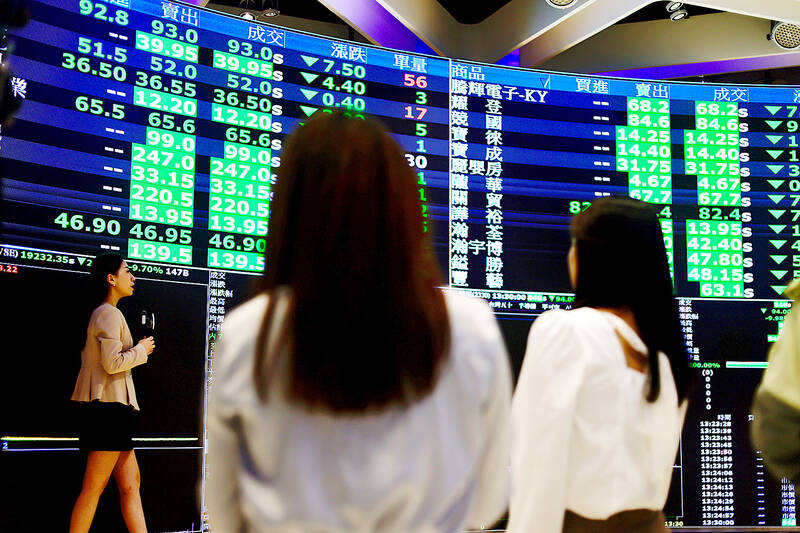Taiwanese sentiment toward the economy turned sharply pessimistic this month, as concerns over US “reciprocal” tariffs weighed on consumer confidence, cooled investment interest and softened home-buying enthusiasm, a survey released yesterday by Cathay Financial Holding Co (國泰金控) showed.
The latest results showed a steep deterioration in public perceptions of both the current and future economic outlook.
The index measuring views on the current economic situation plunged to minus-44.5, while the outlook index fell to minus-41.3, both registering steep declines, Cathay Financial said.

Photo: RITCHIE B. TONGO, EPA-EFE
Consumer sentiment has clearly deteriorated, with the index for durable goods consumption falling to minus-18.3, the willingness to sell homes sliding to minus-20.3 and home-buying intention diving to minus-50.3, the survey found.
Respondents also adopted a more cautious outlook on GDP growth and inflation for the year, the company said.
On average, the public expects GDP growth of 2.63 percent, with 62 percent of respondents predicting the final figure would fall below 3 percent.
While the Directorate-General of Budget, Accounting and Statistics (DGBAS) in February forecast 3.14 percent GDP growth for this year, the National Development Council last week said that the economy could shrink by as much as 1.61 percent — bringing growth down to just 1.53 percent — due to the potential impact of looming US tariffs.
Meanwhile, the public expects consumer prices to rise by 2.33 percent — higher than the DGBAS’ forecast of 1.94 percent — with about 70 percent of respondents anticipating inflation to exceed the 2 percent mark, the survey showed.
Stock investors also shared the bleak sentiment, weighed down by concerns over a potential global economic slowdown, Cathay Financial said.
The index measuring views on the local stock market dropped to minus-23.3, while the risk appetite index edged down to 3.4, reflecting growing caution among individual investors.
Adding to the pessimism, 55 percent of respondents reported that housing prices in their area had risen by 3 percent over the past six months. Nearly half — 48 percent — expect a similar increase in the next six months, although most agreed the housing market had shown signs of slowdown, the survey found.
The survey showed that consumers and investors are bracing for a tougher environment marked by slowing economic growth, rising inflation and greater market volatility amid ongoing geopolitical tensions and global trade uncertainty, Cathay Financial said.
The survey was conducted from April 1 to 7 and gathered 13,693 valid online responses from clients of Cathay Life Insurance Co (國泰人壽) and Cathay United Bank Co (國泰世華銀行), both wholly owned subsidiaries of Cathay Financial.

To many, Tatu City on the outskirts of Nairobi looks like a success. The first city entirely built by a private company to be operational in east Africa, with about 25,000 people living and working there, it accounts for about two-thirds of all foreign investment in Kenya. Its low-tax status has attracted more than 100 businesses including Heineken, coffee brand Dormans, and the biggest call-center and cold-chain transport firms in the region. However, to some local politicians, Tatu City has looked more like a target for extortion. A parade of governors have demanded land worth millions of dollars in exchange

An Indonesian animated movie is smashing regional box office records and could be set for wider success as it prepares to open beyond the Southeast Asian archipelago’s silver screens. Jumbo — a film based on the adventures of main character, Don, a large orphaned Indonesian boy facing bullying at school — last month became the highest-grossing Southeast Asian animated film, raking in more than US$8 million. Released at the end of March to coincide with the Eid holidays after the Islamic fasting month of Ramadan, the movie has hit 8 million ticket sales, the third-highest in Indonesian cinema history, Film

Taiwan Semiconductor Manufacturing Co’s (TSMC, 台積電) revenue jumped 48 percent last month, underscoring how electronics firms scrambled to acquire essential components before global tariffs took effect. The main chipmaker for Apple Inc and Nvidia Corp reported monthly sales of NT$349.6 billion (US$11.6 billion). That compares with the average analysts’ estimate for a 38 percent rise in second-quarter revenue. US President Donald Trump’s trade war is prompting economists to retool GDP forecasts worldwide, casting doubt over the outlook for everything from iPhone demand to computing and datacenter construction. However, TSMC — a barometer for global tech spending given its central role in the

Alchip Technologies Ltd (世芯), an application-specific integrated circuit (ASIC) designer specializing in server chips, expects revenue to decline this year due to sagging demand for 5-nanometer artificial intelligence (AI) chips from a North America-based major customer, a company executive said yesterday. That would be the first contraction in revenue for Alchip as it has been enjoying strong revenue growth over the past few years, benefiting from cloud-service providers’ moves to reduce dependence on Nvidia Corp’s expensive AI chips by building their own AI accelerator by outsourcing chip design. The 5-nanometer chip was supposed to be a new growth engine as the lifecycle